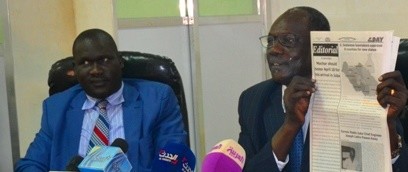The Association for Media Development in South Sudan (AMDISS) and three other media bodies have accused Minister of Information and Broadcasting Michael Makuei of seeking to intimidate the press after he threatened journalists over reporting on the 28 states.
Makuei on Tuesday ordered radio stations to end live call-in shows and he also demanded that journalists use only the names of the 28 states as defined in a presidential decree issued last October, rather than the names of the the ten constitutionally established states.
The information minister’s directive is potentially significant as it would inhibit reporting on implementation of the peace deal signed in August 2015. The peace deal relies on a power-sharing formula in ten states, not 28, and gives the opposition two of ten governorships.
However, in December last year President Salva Kiir appointed 28 new governors for the new states, including in areas that the peace agreement had said would be ruled by SPLM-IO governors. For these reason, monitors of the peace deal have called the presidential order a violation of the peace agreement.
Two journalists last month were abducted and tortured for writing articles critical of the establishment of the 28 states. Critics say that the states have been created along tribal boundaries and outside the bounds of the country’s constitution and laws, which stipulate there are ten states and ten state budgets.
In a press conference at the premises of the information ministry on Tuesday, Makuei threatened to shut down newspapers and radios if they do not recognize the presidential order creating 28 states. He pointed out that some journalists still refer to places on the basis of the previous ten ‘defunct’ states.
However, AMDISS, the Union of Journalists, the National Editors Forum and the Association for Women in Media in South Sudan say that warning writers over how to write about political processes such as the 28 states amounts to undermining freedom of expression.
Makuei, for his part, tried to equate criticism of the 28 states with allegiance to the armed opposition group SPLM-IO. “You don’t recognize this order and you don’t recognize that there are 28 states in South Sudan… Sometimes you refer to them as ‘proposed’ 28 states… proposed by whom? Who is that you are waiting for? Are you waiting for the SPLM-IO to come and confirm them?”
“This is rubbish. These 28 states are not changing whether the [SPLM] IO comes or not,” said Makuei.
“You have the states and the names of the governors. This idea of writing anyhow must stop. You must write responsibly… because if you don’t write responsibly then you are definitely not a journalist. I request that you abide by this so that you don’t step on the toes of others. And whoever steps on the toes of others definitely pays for that,” he added.
The media associations, on the other hand, writing in a press release yesterday, said that these remarks “constitute a threat and repression on the work of the media in South Sudan.”
Information minister hints at his own departure
In his remarks Tuesday, Makuei hinted that he may not be reappointed Minister of Information when the Transitional Government of National Unity is formed. Makuei has been an outspoken proponent of government war efforts and he criticized the peace deal before its signing in August 2015.
“The fact that the Transitional Government of National Unity is coming in does not mean that you will continue to abuse it. It will be the same government, by the way. It will be the same government. Even if it is not the same minister here, that minister who will come will be just the same as this minister now. This is for your information. So don’t try to do things the way you think because ‘they are going.’”
“Where are we going? We are not going, we are staying in the country here.”
“And for your information, minister of information and telecommunications is under the government. So where will you go? So I’m advising you, I’m advising you, and this is my last advice to you. Otherwise, I will go with some of you. Yes. I will go with some of you, if you are not careful… some of you will go before me, before I go,” he said.
For its part, AMDISS commented that these remarks were not clear in meaning: “Further threats such as “some journalists will go before he leaves the Ministry or go with him” are serious intimidations to journalists and is not a clear statement on what that should mean exactly.”
However, Makuei complained that “South Sudan is the only place where there is absolute freedom of press and media.”
CEPO says threats to media not beneficial
Edmund Yakani, executive director of the civil society organization CEPO, has reacted to Makuei’s statements saying that the peace partners must work to provide safe and protective space for the media and journalists to cover the political developments around the peace accord implementation.
“Threatening and scaring media and journalists at the current time is not beneficial and it contributes in denying public access to accurate information. Implementation of the peace agreement… requires provision of space for expression of information in balanced and professional manner,” said Yakani.
He said time has come for all South Sudan to be given the opportunity of speaking out and all media and journalists have to balance information.
Call-in shows on radio
Makuei also warned Eye Radio and UN Radio Miraya not to air programs as a ‘political platform’ for nonsense against the government. “The managers, the general managers of the FM radios, you must be very careful,” he said.
Media leaders, however, say that citizens should be allowed to speak on the radio.
“AMDISS, together with UJOSS, AMWISS and NEF, would like to encourage the media fraternity to continue in their work to inform, educate entertain the citizens of South Sudan and be watch dogs against abuses in public offices,” reads their press statement.




